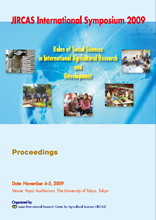The World Four Crises : Implications for the Food Security of Developing Countries

The 2007/08 international food price crisis, energy crises, economic recession and climate
change have and are causing hardship on a number of fronts. It has led to economic hardship
among the poor and generated political turmoil in many countries, and it could result in
long-term, irreversible nutritional damage, especially among children. There is a global interest
in preventing the recurrence of such events and in policies for food security. In this presentation,
the following actions to re-prioritize agriculture are proposed:
(a) Global collective actions to avoid extreme price spikes and to ensure that the world can
respond to emergency needs for food. One significant contributor to the food price crisis was
significant financial resources entering the futures markets, including food commodities markets,
leading to a price spike during the first six months of 2008. This episode shows that the
international financial architecture needs to be modified to address the problem of price spikes
but especially of its effects on livelihood of the poor. Two global collective actions to meet this
goal are proposed: First, a small physical food reserve should be established to facilitate a
smooth response to food emergencies; and second, a new international coordinated global food
reserve should be established to minimize the risk of individual countries trying to achieve grain
self-sufficiency by rebuilding their own public reserves which could result in a very inefficient
global production system, a large total global reserve, and a very thin global grain market.
(b) Importance of reducing trade barriers and moving ahead the Doha Round. While some
progress has been made in reducing trade-distorting policies, many remain, and poor countries
cannot match them. The new food situation is changing trade regimes in many countries and
this will inevitably have important implications for the current Doha Round negotiations, which
should be completed given that it is essential to assure food security.
(c) Scaling up investments and prioritizing them. There is a clear need to scale up investments
for sustained agricultural growth. The transition to long term viable investments particularly in
support of market access, in agricultural science and technology is urgently needed to transform
the crisis into opportunities and to build resilience for food crises in the future. Two instruments
appear critical to break this deadlock for the smallholders: one is physical infrastructure ?such
as roads, electricity, potable water and drainage, water for irrigation and telecommunications -
that connects smallholders to markets; and the other is the role of accompanying institutions -
such as land titling on the enforcement of property rights; credit markets; and contract farming; vertically integrated schemes; market information systems; commercial rules and laws;
commodity exchanges; warehouse receipt systems; and producer and trader associations on
economic coordination - that can reduce the marketing risk and transaction costs in the process
of exchange between producers and consumers. These investments not only have high returns in
terms of agricultural growth, but also large poverty reduction impact in both rural and urban
areas through increased production and employment, and lower food prices. Although its
prioritization requires that three dimensions in its analysis in linking smallholders to markets be
included: the heterogeneity of small farmers and therefore their specific infrastructure and
institutional bottlenecks in connecting to markets, the complementarities of investment in rural
institutions and infrastructure (capital intensive and post-harvest technologies) may have in
market development and in reducing poverty and the level of market accessibility.
| Date of issued | |
|---|---|
| Creator | Maximo Torero |
| Subject |
Institutions infrastructure reserves price spikes and volatility |
| Publisher | Japan International Research Center for Agricultural Sciences |
| Available Online | |
| Issue | 2009 |
| spage | 15 |
| epage | 23 |
| Rights | Japan International Research Center for Agricultural Sciences |
| Language | eng |
